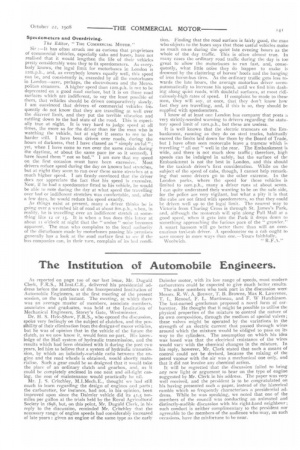THE COMMERCIAL MOTOR
Page 15

If you've noticed an error in this article please click here to report it so we can fix it.
Speedometers and Overdriving.
The Editor, "THE COMMERCIAL MOTOR."
Sir : —It has often struck me as curious that proprietors of commercial vehicles, especially cabs and buses, have not realised that it would lengthen the life of their vehicles pretty considerably were they to fit speedometers. As everybody knows, the legal limit for motorbuses in London is 12m.p.h., and, as everybody knows equally well, this speed can be, and consistently is, exceeded by all the motorbuses in London—save, perhaps, the electrobuses and the Metropolitan steamers. A higher speed than 12m.p.h. is net to be deprecated on a good road surface, but it is on those road surfaces which are indifferent, to say the least possible of them, that vehicles should be driven comparatively slowly. I am convinced that drivers of commercial vehicles frequently do not know that they are travelling at well over the discreet limit, and they put the terrible vibration and rattling down to the bad state of the road. This is especially true at night. It is very hard to judge speed at all times, the more so for the driver than for the man who is watching the vehicle, but at night it seems to me to be harder still. I have been driven over roads, during the hours of darkness, that I have classed as " simply awful "; yet, when I have come to run over the same roads during the daytime, at about the same pace (or so it seemed), I have found them " not so bad." I am sure that my speed on the first occasion must have been excessive. Most drivers reduce speed during the day on known bad stretches, but at night they seem to run over these same stretches at a much higher speed. I am firmly convinced that the driver does nor appreciate the fact that his speed is excessive. Now, if he had a speedometer fitted to his vehicle, he would be able to note during the day at what speed the travelling Over bad or indifferent stretches was comfortable, and, after a few days, he would reduce his speed exactly. As things exist at present, many a driver thinks he is going over a wretched bit of road at about 8m.p.h., \\ hen, in reality, he is travelling over an indifferent stretch at something like 12 or 15_ It is when a bus does this latter at about it o'clock at night that the " undue " noise becomes apparent. The man who complains to the local authority of the disturbance made by motorbuses passing his premises generally has a took at the road surface first to see if the bits companies can, in their turn, complain of its bad condi tion. Finding that the road surface is fairly good, the man who objects to the buses says that these useful vehicles make as much no.se during the quiet late evening hours as the whole of the day traffic. This is often almost true. In many cases the ordinary road traffic during the day is too great to allow the motorbuses to run fast, and, consequently, what little noise they do happen to make is drowned by the clattering of horses' hoofs and the banging of iron horse-bus tires. As the ordinary traffic gets less towards the late hours, the average motorbus driver seems automatically to increase his speed, until we find him dashing along quiet roads, with doubtful surfaces, at most ridiculously-high rates of speed. If complaint be made to these men, they will say, at once, that they don't know how fast they are travelling, and if this is so, they should be supplied with speedometers.
I know of at least one London bus company that posts a very strictly-worded warning to drivers regarding the statutory speed limit of t2m.p.h., but these are useless.
It is well known that the electric tramcars on the Embankment, running as they do on steel tracks, habitually exceed the limits laid down for them by the Board of Trade, but I have often seen motorcabs leave a tramcar which is travelling " all out " well in the rear. The Embankment is wide, and there is not much slow traffic; therefore, high speeds can be indulged in safely, but the surface of the Embankment is not the best in London, and this should be the taxicab driver's first consideration_ While on the subject of the speed of cabs, though, I cannot help remarking that smite drivers go to the other extreme. In the London parks, where the speed for these vehicles is limited to fom.p.h., many a driver runs at about seven. I can quite understand their wanting to be on the safe side, for the police are very vigilant, but what a pity it is that the cabs are not fitted with speedometers, so that they could be driven well up to the legal limit. The nearest way to Victoria from Charing Cross is through St. James's Park, and, although the motorcab will spin along Pall Mall at a good speed, when it gets into the Park it drops down to something approaching the furious pace of the " growler." A smart hansom will go better there than will an overcautious taxi-cab driver. A speedometer on a cab ought to save money in more ways than one.—Yours faithfully,
Woolwich.




















